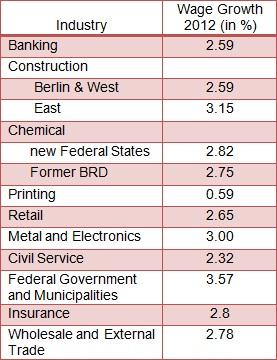German wages grow faster than euro area average
In 2012 German wages increased faster than in the rest of the European Union. In the first quarter German nominal wages and salaries increased by 2.1
In 2012 German wages increased faster than in the rest of the European Union.
In the first quarter German nominal wages and salaries increased by 2.1 percent compared to the same quarter in 2011[1] whereas they grew 1.6 percent in the euro area and 1.5 percent in the whole EU27 (year-over-year).[2] During the second quarter of 2012 year-over-year growth rates increased a little more with nominal wages rising by 2.5 percent in Germany[1] compared to 1.7 percent in the euro area and 1.9 percent in the EU27[2].
The German wage growth is further supported by a more detailed look at the growth rates in certain industries. In 2012 new wage and salary agreements were reached through collective bargaining in main occupational fields. Taking previous negotiations into account and annualizing the growth rate for 2012 shows the actual wage increases in those fields. The growth rates this year range from only 0.59% in the printing industry to 3.57 percent in the civil service of the German federal government and municipalities, having an average of 2.63 percent (see Table).1

Annualized Wage Growth Rates 2012. Calculated from collective bargaining agreements, information taken from the German Statistical Federal Statistical Office of Germany.[1] Annualized rates calculated by Bruegel.
The numbers suggest that the adjustment process has started in the euro area. At the same time, the size of the differential between Germany and the euro area is still of a size that relative adjustment of wages may take 5 years.
[1] Deutsches Statistisches Bundesamt (2012)
[2] Eurostat (http://epp.eurostat.ec.europa.eu)



